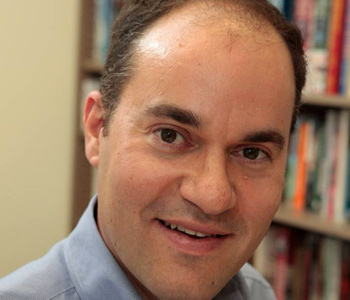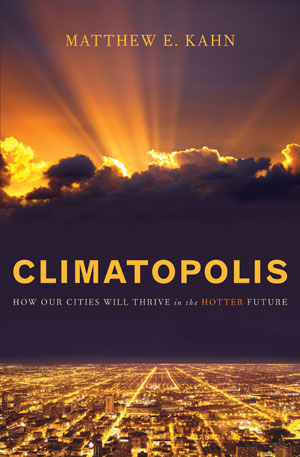
The core theme of Climatopolis is ironic. Free market capitalist growth has caused climate change—but the same individualist forces will help us to adapt to climate change.
My starting point is that we have to be honest that we have collectively chosen to run a dangerous experiment. The book’s first chapter is titled “Too Much Gas.” As India and China and other developing countries achieve their version of the “American Dream,” global greenhouse gas emissions will continue to rise.
Climate change poses many potentially nasty threats for different parts of the world. Yet we are not doomed. Our ability to anticipate future suffering actually provides us with an “early warning” system to take pro-active actions ahead of time that help to protect our families.
Neither I nor anyone else has a crystal ball that precisely predicts how climate change will affect different cities ranging from Los Angeles to Cairo. But, we “know that we do not know” and this provides strong incentives to plan ahead. As climate scientists make progress predicting the increased likelihood of extreme weather events, this new information will affect where households live, how they live and the construction of the types of buildings where they live and work.
Climatopolis offers a preview of how urbanites will adapt to the scary and ambiguous challenge of climate change.
Consider the Moscow Heat Wave of 2010. It killed thousands and this was a tragedy. But a silver lining of this disaster is that people of Moscow learned that such extreme heat waves are now more likely to occur. Such households will now purchase air conditioners and take other steps to protect their families. Such “small ball” investment decisions will sharply reduce the death count from the next heat wave.
Capitalist firms play a key role in my optimistic vision. Demand creates supply. Profit-driven firms will pursue the introduction of products that are likely to be highly demanded.
If I am the only bald man in the world, then no drug company will engage in the costly and risky R&D investment to find a cure for baldness. If profit-driven firms anticipate that climate change will sharply increase the demand for energy efficient products and housing designs that can withstand extreme heat and flooding, then they will have sharp incentives to develop them.
In this sense, capitalism evolves to help us cope with climate change. The anticipation of doom creates new profit opportunities that ironically help to protect us from the doom.
“Capitalism evolves to help us cope with climate change. The anticipation of doom creates new profit opportunities that ironically help to protect us from the doom.”
I am an academic economist and most of my research has focused on the quality of life of cities.
Most economists agree that the key for long run city sustainability is attracting and retaining the skilled. Detroit is poor today because the skilled and the “creative class” do not want to live and work there. Google would open branches in Detroit if enough of its team wanted to live there.
Where do people want to live? I have argued that local quality of life is a crucial factor. And environmental quality—ranging from day to day climate, to local pollution levels and access to green space—is a key ingredient in determining a city’s quality of life.
I have been quite interested in the quality of life dynamics of cities such as Pittsburgh as it de-industrialized. Today, I am studying whether China’s major cities will enjoy a similar environmental improvement as they shift their industrial structure and invest in environmental regulation.
In 2006, the Brookings Institution Press published my Green Cities: Urban Growth and the Environment. That book focused on how local pollution challenges such air pollution, water pollution, and access to green space evolves in a growing economy.
Today, such local indicators of environmental quality are all improving in the United States. Rising income and technological advance and shifts in the location of manufacturing of goods have allowed us to enjoy both ongoing growth and improved environmental quality at the same time.
Climatopolis is meant to be a sequel to Green Cities. While predicting the future is challenging, the book sketches a logical set of claims for how our free market system will facilitate migration and innovation and behavioral change at the individual and firm level that collectively will help us to adapt to the evolving threat of climate change.
The book’s emphasis on the power of free markets has angered liberals.
The first reason for this is the fear of the “lulling effect.” Activists deeply desire carbon mitigation now. If we even begin to consider an optimistic view of our ability to adapt to climate change, then this lulls Joe the Plumber and other middle class moderates into not taking costly action now.
It will be easier to adapt to climate change if we reduce our greenhouse gas emissions now. But we have not reduced our emissions. So it is my job as a researcher to think hard about what is likely to happen next.
Free market capitalism is an evolving system. Its hallmark is the introduction of new products in a trial and error process.
Entrepreneurs are one percent of the world’s population. If climate change becomes the dominant problem we face moving forward, do you doubt that our 70 million entrepreneurs will all fail?
The second reason my book has offended some liberals is that I do not make government “the star” actor.
In fact, I argue that there are many cases in which government policy will impede climate change adaptation.
Today, in Los Angeles water is priced at .5 cents a gallon. This price is set by a non-profit agency—not by market forces. When consumers face artificially low prices, they have no incentive to economize or to seek out more water efficient appliances.
On the other hand, my book has not interested political conservatives either: I take the challenge of climate change very seriously.
To tackle climate change, we must reduce our greenhouse gas emissions. In an economy in which there are more people who are growing richer over time, the only way we can reduce our emissions is if greenhouse gas emissions per dollar of economic output fall sharply.
For this we will need technological progress; we will need to phase out fossil fuels such as coal, gasoline and natural gas, and replace them with renewable power.
Such progress will require all consumers to face higher prices for “cheap” fossil fuels—and this requires government intervention.
Should we raise gas taxes and more generally fossil fuel prices to accelerate the transition to the green economy? Many environmentalists—including myself—would favor this.
I believe that there are significant social costs associated with the status quo reliance on fossil fuels. And I am optimistic that clever entrepreneurs will respond to pricing incentives. They will make technological progress in bringing electric vehicles and solar panels to the market place. Such “green innovation” would allow us to achieve the win-win of ongoing economic growth without the local pollution and greenhouse gas emissions consequences.
But President Obama has risked no political capital pursuing such policies. Indeed, in the midst of ongoing recession, would “Joe the Plumber” re-elect a president who raised energy prices through government policy?
Recognizing the political challenge in changing the rules of the game and raising the cost of fossil fuel energy, Democrats have tried alternative strategies for increasing voter interest in carbon mitigation policies.
Al Gore’s movie, An Inconvenient Truth, can be viewed as a variant on the “Shock and Awe” strategy of changing perceptions through offering a vision of how our future might look like if we continue to produce increasing quantities of greenhouse gas emissions.
Perhaps in part due to Al Gore’s efforts, climate change mitigation is a partisan issue rather than a national security issue.
Today, there is a sharp political cleavage between the political left and right. Survey research documents that in 2008 there was 34 percentage point gap between Democrats and Republicans in their agreement with a statement that the effects of global warming have already begun, up from a 4 percentage point gap in 1997. And I see no signs that this political gridlock will go away.
I wrote Climatopolis because I wanted to start a debate on how individuals and firms respond to a growing “crisis” when their government has been unable to pre-empt the emerging threat.
“The only way we can reduce our emissions is if greenhouse gas emissions per dollar of economic output fall sharply. For this we will need technological progress; we will need to phase out fossil fuels such as coal, gasoline and natural gas, and replace them with renewable power.”
I do not have a crystal ball that tells me what Moscow, Cairo or Los Angeles will look like in the year 2050. But I do know that free market capitalism is centered in cities and their greater metropolitan areas.
I anticipate that over time we will learn about the specific new threats that specific cities face.
Cities that face increased flooding risk will create new profit opportunities for firms that produce products that help to reduce flood risk. If such cities’ political leaders choose to address these emerging threat issues, then local land prices will not decline, and the skilled will continue to live there. If politicians are unwilling or unable to protect the cities, then the skilled will “vote with their feet,” and the firms that hire them will also leave. In this sense, competition between cities protects urbanites.
Over time, we must rebuild our cities. As the world’s cities grow with billions of people moving there, there will be new construction of plenty of infrastructure. Given that cities are long lasting investments, decision makers have the right incentives to invest and to build infrastructure that can withstand the shocks that we believe we will face due to climate change.
A maintained assumption in Climatopolis is that our climate scientists will continue to make objective progress in judging the probability and severity of the impacts of climate change for different regions around the world.
If I am wrong and our climate scientists make no progress in predicting threats—while Mother Nature poses a higher probability threat of extreme events such as flooding or extreme heat waves—then we will suffer greatly when the shocks occur.
But if climate scientists do earn their pay and we are able to develop coarse “leading indicators” about the threats we face—the equivalent of a Tsunami Warning—then I trust that individuals and firms have the right incentives to respond to this information.
After the deep Recession of 2008, it is not “cool” to celebrate free market capitalism. My book intentionally challenges this social norm.
You do not have to be a billionaire to appreciate how free market growth has improved the quality of life for billions of people around the world. Climate change will be a major threat to our quality of life in the next century. And capitalism will again step up to help us to cope with the anticipated and unanticipated challenges we will face.


Matthew E. Kahn is a Professor at the UCLA Institute of the Environment, the Department of Economics, the Department of Public Policy, and the Anderson School of Business. He is a research associate at the National Bureau of Economic Research. Before joining the UCLA faculty, Kahn taught at Columbia and the Fletcher School at Tufts, and also served as a Visiting Professor at Harvard and Stanford. He holds a Ph.D. in Economics from the University of Chicago. Kahn is the author of Green Cities: Urban Growth and the Environment (Brookings Institution, 2006), co-author of Heroes and Cowards: The Social Face of War (Princeton 2009), and Climatopolis, featured in his Rorotoko interview.